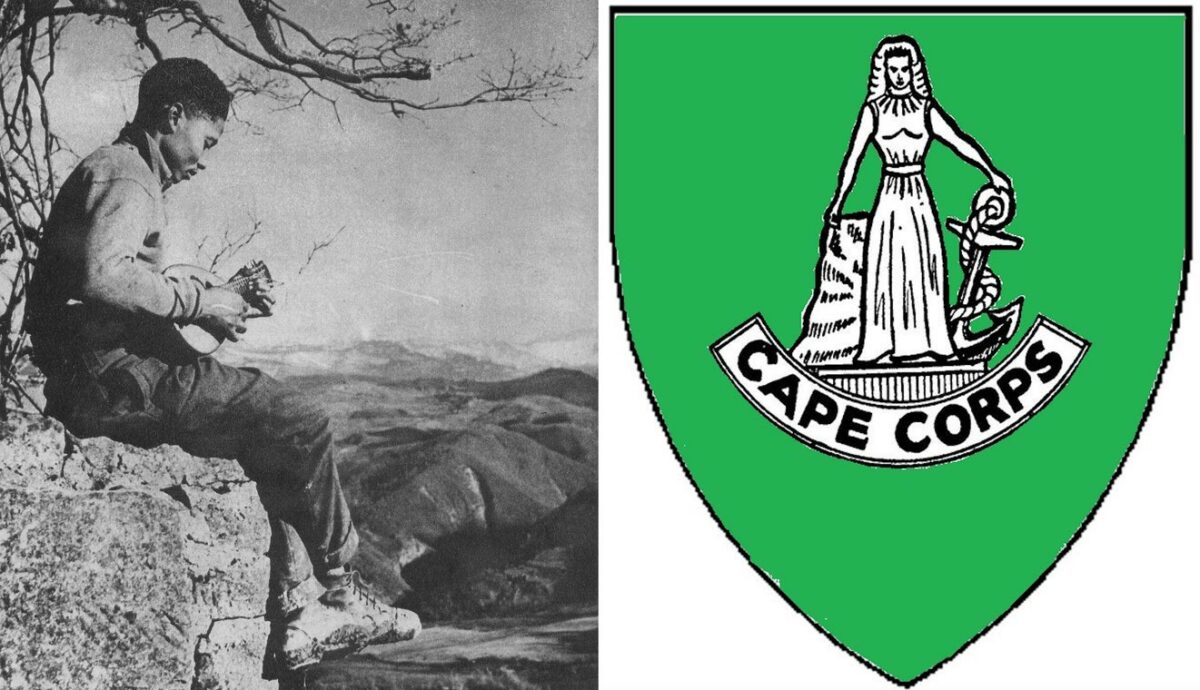Following a unique ceremony held at the South African National Jewish War Memorial at West Park Jewish Cemetery last week, we speak to Peter Bailey as he pays homage to 1 Cape Corps. Mr Bailey is a past National Chairman of the South African Jewish Ex-Service League and a Researcher of South African Jewish military history.
Peter Bailey gives a summary of the interesting history of Cape Corps
The Cape Corps has a proud history dating back to the formation by the Dutch colonial administration of the first military unit made up of members of the Cape Coloured community in 1781. This military unit went through many incarnations and name changes until it was disbanded in 1870, only to be resuscitated in 1915, during the First World War, and named the Cape Corps Battalion.
This Cape Corp Battalion drew volunteers from the Cape Town and Kimberley Coloured communities. A second battalion was formed in 1916, although this was disbanded in early 1918, with the original battalion now renamed as 1 Cape Corps.
On 25 October 1915, a recruitment station for the Cape Corps was opened at the Cape Town City Hall, drawing such a huge response that the police had to be summoned to maintain crowd control. The Cape Corps participated in the British Army East Africa campaign during 1916 and 1917, where they fought gallantly.
Following significant victories, Battle Honours were granted to military units and 1 Cape Corps was awarded four Battle Honours in East Africa; Kilimanjaro, Beho-Beho, Nyangao and Refugi Delta. The battalion then boarded a ship for its return to Cape Town on 20 December 1917.
Upon their return to South Africa, the men of 1 Cape Corps were allowed a period of rest and recuperation, with many of them having suffered the ravages of malaria during the war in East Africa. Despite their proud combat record, 1 Cape Corps was to be sent to Egypt unarmed as non-combatants to provide support services to the British forces.
Their new role caused much unhappiness in the ranks, until Battalion Commander Lt. Col. Hoy made a personal appeal to Egyptian Expeditionary Force commander General Edmund Allenby, for 1 Cape Corps to be employed as combatant troops. After examining their record in East Africa, Allenby agreed and a period of retraining and provisioning took place in preparation for the war against the German/Ottoman Turk alliance in Palestine.
Writing about their training, Captain Ivor Difford, author of The Story of the First Battalion Cape Corps said “We had left the amateur stage behind us and were by way of becoming professionals.
A period of intensive training was commenced in musketry, bayonet fighting, the use of hand grenades, gas warfare and trench warfare.” Following intensive training between April and July 1918, the men of 1 Cape Corps were ready to go into battle.
Allenby planned a major offensive, which would begin with reconnaissance on 17 September, before commencing the battle to dislodge the enemy from Palestine and open the road to Damascus for the Expeditionary Force. 1 Cape Corps was given responsibility for attacking a Turko German stronghold named Square Hill, close to the biblical city of Shiloh.
During the attack which commenced at 18:45 on 18 September, and lasted until 04:00 on 19 September, 1 Cape Corps successfully overcame the enemy forces and captured Square Hill as ordered. During battle 1, Cape Corps took 181 prisoners and seized a Turkish artillery gun.
The Battle of Square Hill was over, with 1 Cape Corps with two casualties, 1 killed and another wounded. 1 Cape Corps was next ordered to take Kh Jibeit, another hill some 700 metres north of Square Hill. The South Africans had no artillery support and took substantial losses in achieving their objective. 1 Cape Corps lost 51 officers and men killed, 101 wounded and 1 taken prisoner by the retreating Turkish forces. The victories at Square Hill and Kh Jibeit were decisive in opening the road to Damascus for Allenby’s forces.
1 Cape Corps was honoured in being able to add Megiddo, Nablus and Square Hill to the battalion Battle Honours. Some 55 years later Cape Town Mayor David Bloomberg signed a charter granting the Freedom of the City of Cape Town to 1 Cape Corps.
Following the victory of 1 Cape Corps at Square Hill, eminent British military historian Captain B.H. Liddell Hart (1895 – 1970) wrote that “the operation was one of the most quickly decisive and most completely decisive battles in all history. Within a few days, the Turkish armies in Palestine had practically ceased to exist.”
The victory of the British Empire forces enabled the publication of the Balfour Declaration, which had previously been suppressed in Palestine until Britain was in a position to deliver on its promise of a Jewish Homeland made in the Balfour Declaration.

